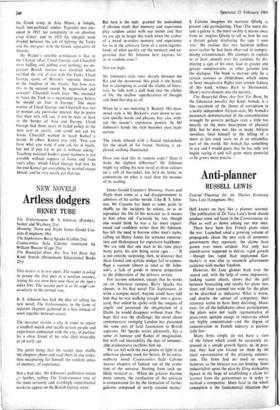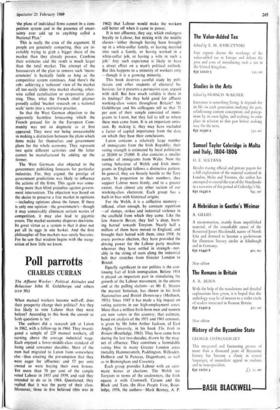Central Planning for the Market Economy Vera Lutz (Longmans 50s)
Anti-planner
RUSSELL LEWIS
Central Planning for the Market Economy Vera Lutz (Longmans 50s)
Hell knows no fury like a planner scorned. The publication of Dr Vera Lutz's book should produce some red faces in the Commissariat du Plan as well as down among our NED men.
There have been five French plans since the war. Launched amid a growing .volume of propaganda about the new style of economic government they represent, the claims have grown ever more strident. Not only was planification supposed to deliver rapid growth —though less rapid than unplanned Ger- many's—it was also to reconcile government guidance with market freedom.
However, Dr Lutz glances back over the record and, with the help of some impressive- looking scatter charts, shows that the gulf between forecasting and results for plans two, three and four yawned too wide for the plans to be described as indicative. What is worse, and despite the advent of computers, their accuracy seems to have been declining. More- oyer, for all the hullabaloo about participation, the plans were not really representative of grass-roots opinion except in industries which are highly concentrated—and the degree of concentration in French industry is particu- larly low.
Many firms simply do not have a view of the future which could be accurately ex- pressed in a simple growth figure, so, in prac- tice, they had one foisted on them by the local representative of the planning commis- sion. The firms had no need to worry, however, as the forecast was not binding. Some industrialists upset the plan by filing misleading figures in the hope of establishing a claim for favours from the government or in order to mislead a competitor. More fatal to the whole conception is the fundamental objection that
'the plans of individual firms cannot in a Com- petition system and in the presence of uncer- tainty ever add up to anything called a National Plan.'
This is really the crux of the argument. If people are genuinely competing, they are in- evitably trying to grab a bigger share of the market than they already possess. Combine their estimates and the result is much larger than the total market. The attempt of the bureaucrats of the plan to remove such 'incon- sistencies' is basically futile as long as the competitive system continues. And there's the rub: achieving a 'coherent' view of the market all too easily slides into market sharing, other- wise called cartelisation or corporative plan- ning. Thus, what the French chief planner proudly called 'market research on a national scale' turns into a restrictive practice.
So that the West German objection to the apparently harmless forecasting which the French pressed for in the European Com- munity was not so dogmatic as at first appeared. They were not being unreasonable in making a distinction between the plans which firms make for themselves and government plans for the whole economy. They represent two quite different activities and the latter cannot be manufactured by adding up the former.
The West Germans also objected to the government publishing forecasts for particular industries. For, they argued, the prestige of government predictions was likely to influence the actions of the firms. This again was some- thing more than blind prejudice against govern- ment intervention. The objection was based on the desire to preserve a free market in opinions —including opinions about the future. If there is only one opinion—the government's—though it may conceivably eliminate certain wastes of competition, it may also lead to gigantic errors. The market economy disperses decisions. Its great virtue as a system is that it does not put all its eggs in one basket. And the first philosopher of free markets was surely Socrates. For he saw that wisdom begins with the recog- nition of how little we know.



































 Previous page
Previous page